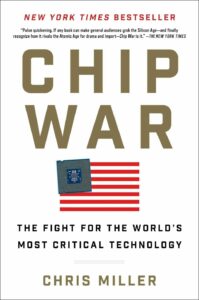
Mike Pence on Leadership and the Future of the Republican Party
Former US Vice President Mike Pence looks back on the events of January 6 2021, his final days in office with President Trump and his…
Thought Leader: Mike Pence
 At once edifying and entertaining, Chris Miller’s book traces the history of the global semiconductor industry. Early on, firms producing semiconductors depended on demand for their products from the U.S. defense and military establishment. Now, by contrast, that defense establishment depends on the chip industry for critical strategic and battlefield capabilities. Over time, the decisions of charismatic entrepreneurs and less charismatic government officials combined to produce the current international division of labor, whereby advanced chip design is carried out in the United States; essential manufacturing equipment is produced in Japan, the Netherlands, and the United States; and over a fifth of all chip fabrication happens in Taiwan—a place that, as a result, has become an economic and geopolitical flash point. “Chip war” now characterizes the U.S.-Chinese rivalry, with Beijing seeking to build up design and manufacturing capabilities and Washington hoping to slow China’s progress. Miller is a fluent narrator, but he finalized the book before recent shifts in U.S. policy, which seek to deny China advanced chip-making technology. He delivers no verdict on whether U.S. export controls will succeed in containing the rise of China’s semiconductor industry or whether they will only spur China to further support the industry and maybe even lead it to move aggressively against Taiwan.
At once edifying and entertaining, Chris Miller’s book traces the history of the global semiconductor industry. Early on, firms producing semiconductors depended on demand for their products from the U.S. defense and military establishment. Now, by contrast, that defense establishment depends on the chip industry for critical strategic and battlefield capabilities. Over time, the decisions of charismatic entrepreneurs and less charismatic government officials combined to produce the current international division of labor, whereby advanced chip design is carried out in the United States; essential manufacturing equipment is produced in Japan, the Netherlands, and the United States; and over a fifth of all chip fabrication happens in Taiwan—a place that, as a result, has become an economic and geopolitical flash point. “Chip war” now characterizes the U.S.-Chinese rivalry, with Beijing seeking to build up design and manufacturing capabilities and Washington hoping to slow China’s progress. Miller is a fluent narrator, but he finalized the book before recent shifts in U.S. policy, which seek to deny China advanced chip-making technology. He delivers no verdict on whether U.S. export controls will succeed in containing the rise of China’s semiconductor industry or whether they will only spur China to further support the industry and maybe even lead it to move aggressively against Taiwan.
Mike Pence on Leadership and the Future of the Republican Party
Former US Vice President Mike Pence looks back on the events of January 6 2021, his final days in office with President Trump and his…
Thought Leader: Mike Pence
Marc Short on U.S. Investment in Critical Minerals
Why do critical minerals matter now? Marc Short explains how U.S. investment in critical minerals fits into a broader strategy around economic security, manufacturing, and…
Thought Leader: Marc Short
Marc Short on AI Policy and the Government’s Role in Chip Technology Investment
On CNBC, Marc Short breaks down the role of AI policy and how government investment is shaping the future of chip technology. A former Chief…
Thought Leader: Marc Short

